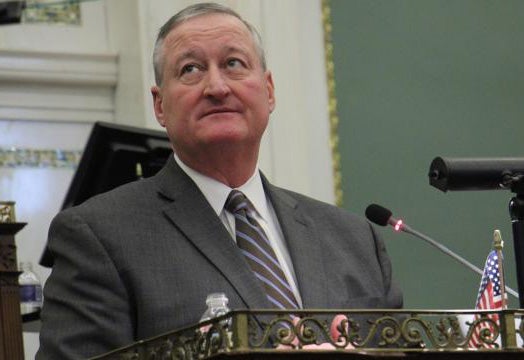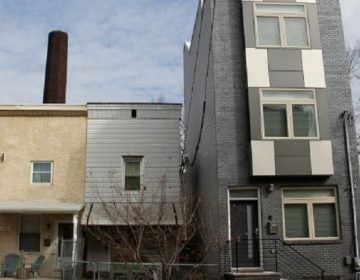Philly’s construction tax is dead and Kenney wants to pay for affordable housing with cash from abatements
For the mayor’s proposal to move forward, the construction tax’s sponsors would have to recall the construction tax bill on Thursday, Sept 13.
Listen 2:16
Mayor Kenney speaks at annual budget address. (Emma Lee/WHYY)
One day before Philadelphia City Council is scheduled to return for its fall session, Mayor Jim Kenney’s administration has proposed an alternative to the controversial 1 percent construction tax passed by the council in the spring.
At a press briefing held on Wednesday morning, the administration promised almost $53 million over five years, to be secured from revenues coming from properties with expiring 10-year tax abatements. Like the council’s construction tax, the money from the abatement would go into the Housing Trust Fund.
“This is revenue that is recurring and reliable and we think this is the best way to fund these initiatives,” Jim Engler, the mayor’s chief of staff said on Wednesday.
The proposal has already been met with opposition from City Council President Darrell Clarke, one of the champions of the construction tax. Clarke’s response memo, shared with the council immediately after the mayor’s briefing, argued that the funding scheme is “inadequate.”
If the administration can secure council’s buy-in, city officials would send a transfer ordinance to the legislative body on Thursday to appropriate $19 million to the Housing Trust Fund. That money would represent this fiscal year’s contribution to the fund. Over the next four years, the appropriation would shrink because fewer properties will be exiting the abatement due to the slowdown in construction that occurred during the Great Recession that began in 2008.
For the mayor’s proposal to move forward, the construction tax’s sponsors would have to recall the construction tax bill on Thursday, Sept 13.
Clarke showed no immediate sign of backing down on Wednesday. “If the goal is to address an affordable housing shortage that was caused by a severe drop-off in federal funding – which will not be restored in the near future, if at all – then we must identify new sustainable, dedicated revenue sources for HTF,” reads Clarke’s memo.
Clarke also questioned the wisdom of tying funding for affordable housing to the 10-year tax abatement, which many Council members have signaled a desire to reform or even eliminate.
“If we scale back the abatement, commit most City-side revenue to the HTF, and do nothing else.” the memo reads, “then what is the plan for other City services that we have previously been unable to adequately fund?”
Engler stated that the administration is still open to discussing the future of the abatement. Regardless of what happens with that policy, there are still ten years of abated properties in the pipeline right now which can be diverted to affordable housing, he noted.
The fate of the construction tax haunted City Hall all summer. The bill passed Council on a 9-to-8 vote on the last day of the spring session, the narrowest legislative victory since the similarly tight approval of a mandatory paid sick leave bill in 2011.
Many believed that Kenney would exercise his veto power for the first time to stop the bill, citing the administration’s persistently critical analysis of the legislation. The mayor is closely allied with the city’s building trades unions, which have come out adamantly against the construction tax because they anticipate it will stunt development.
But multiple Council insiders familiar with the negotiations say that Kenney did not want to exercise his veto power on a bill meant to fund affordable housing. The mayor even visited Council President Clarke last week to propose the allocation from previously abated properties as a compromise.
This is the first time Kenney indicated he would be willing to use money from the general fund to boost the Housing Trust Fund, marking a significant concession after a bruising budget season.
Sources close to last week’s discussion say that Kenney offered roughly $10 million annually, insisting that Clarke’s projections for the construction tax — $22 million annually — were unrealistically high. That is still basically the administration’s offer despite the council’s desire to create an annual flow of at least $20 million for housing.
If the Kenney administration is able to secure this compromise solution, it could save both sides’ face. The mayor will have prevented the construction tax from being enacted, winning approval from the building trades unions and many major developers, while Clarke and Councilwoman Maria Quiñones-Sanchez — who began the Council debate over affordable housing with her 2017 mandatory inclusionary zoning bill — will have won a new stream of revenue for affordable housing — at least for the foreseeable future.
But many advocates don’t love the idea of relying on mayoral largesse for additional housing dollars. Without the infusion for the trust fund written into law, they fear the funding will not be guaranteed in perpetuity.
“They can only commit for as long as he is mayor and that won’t be forever,” said Beth McConnell, policy director for the Philadelphia Association of Community Development Corporations. “Or they [the Kenney administration] can renege on it at any time.”
But Engler tried to downplay those concerns at Wednesday’s press conference.
“Even with the construction tax it would have to be appropriated each year through the budget process,” said Engler. “Council can pass an ordinance that says that but they still have to go through the budget process. What we’re saying is that we are setting a bar and we would hope that future administrations would continue to fund affordable housing.”
Real estate developers, however, should be happy with the arrangement. Residential developers would have felt the burden of Quiñones-Sanchez’s mandatory inclusionary zoning bill and the entire development industry would have paid for the construction tax. Now they will pay nothing.
“For our part the BIA and its members see the value of creating more affordable housing options … and we agreed to be further taxed to help do so,” said Leo Addimando, president of the Building Industry Association. “We can’t control the politics of how things ultimately play out.”
WHYY is your source for fact-based, in-depth journalism and information. As a nonprofit organization, we rely on financial support from readers like you. Please give today.







